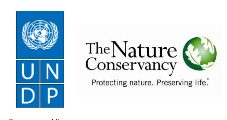The UN Development Programme (UNDP) organized a briefing and round table on “Advancing Biodiversity, Ecosystems and Community Empowerment for the Sustainable Development Goals (SDGs),” hosted by The Nature Conservancy (TNC).
Participants discussed ways to integrate environmental sustainability and community-based action into the post-2015 development agenda.
 16 April 2013: Participants at a recent briefing and round table on “Advancing Biodiversity, Ecosystems and Community Empowerment for the Sustainable Development Goals (SDGs),” organized by the UN Development Programme (UNDP) and hosted by The Nature Conservancy (TNC), discussed ways to integrate environmental sustainability and community-based action into the post-2015 development agenda.
16 April 2013: Participants at a recent briefing and round table on “Advancing Biodiversity, Ecosystems and Community Empowerment for the Sustainable Development Goals (SDGs),” organized by the UN Development Programme (UNDP) and hosted by The Nature Conservancy (TNC), discussed ways to integrate environmental sustainability and community-based action into the post-2015 development agenda.
The event, held in Arlington, Virginia, US, on 16 April 2013, aimed to: share information on the post-2015 process, including opportunities to contribute; explore how environmental sustainability and community-based action can contribute to the post-2015 agenda, such as under goals, targets and indicators or as means of implementation; and explore forming a coalition to advance community-based action for environmental sustainability in the post-2015 agenda.
During the session on “Understanding the Process, Emerging Opportunities and Entry Points,” Olav Kjøven, UN Assistant Secretary-General, reflected on progress towards the Millennium Development Goals (MDGs) while also underscoring challenges, including inequality and a changing world. Kjørven also described: the work of the High-level Panel on the Post-2015 Development Agenda (HLP); Open Working Group (OWG) on the Sustainable Development Goals (SDGs); and national and global thematic consultations. He highlighted lessons learned from the process, including: the importance of sustaining the MDGs; and ensuring a more holistic, integrated approach to address environmental sustainability, governance, inequality, youth employment and violence.
The round table on the topic of “Changing the Narrative on Environmental Sustainability” discussed four areas: emerging narratives on environmental sustainability and community-based action, including field evidence; challenges to advancing these issues in the post-2015 framework and the SDGs; actions to integrate these issues, including from other sector coalitions; and elements of an action agenda. It included six panelists: Naoko Ishii, CEO, Global Environment Facility (GEF); Tom Lovejoy, United Nations Foundation; Julia Marton-Lefèvre, Director General, International Union for Conservation of Nature (IUCN); Russell Mittermeier, President, Conservation International (CI); Glenn Prickett, TNC; and Mathis Wackernagel, President, Global Footprint Network. Noting increased understanding of planetary boundaries, Ishii highlighted GEF programs to create sustainable beef, palm oil and soybean supply chains and to green global fisheries, underscoring the vital role communities play in both programs. Mittermeier proposed linkages between the SDGs and the Aichi Biodiversity Targets.
Kjørven summarized priorities for the environmental sustainability agenda, noting, inter alia: the need for increased participation by indigenous and marginalized populations; the OWG report as a key entry point; and the Sustainable Energy for All (SE4ALL) Initiative as a model for a SDG consisting of economic (efficiency), environmental (renewables) and social (access) elements.
Moderator Charles McNeill, UNDP, highlighted key discussion themes including the need for: a movement; consistent messaging; cross-sectoral linkages; and recognizing natural capital and resource productivity in the SDGs. [UN Briefing and Roundtable Report]